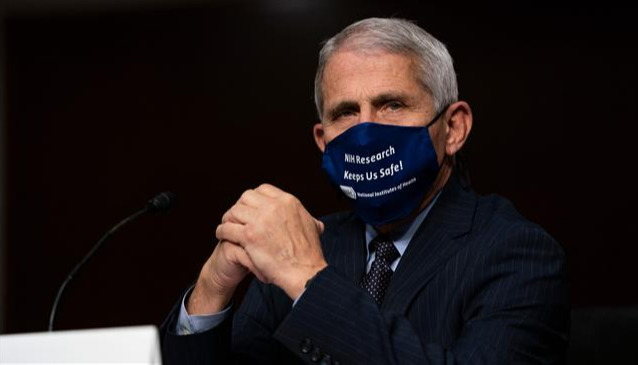
Dr. Anthony Fauci, Director, National Institute of Allergy and Infectious Diseases, National Institutes of Health. (Photo: AFP)
Washington, October 30 (RHC)-- The White House coronavirus task force has warned of a persistent and broad spread of COVID-19 in the western half of the United States, and its members urged aggressive measures to curb the surge of infections.
The hardest-hit areas include a number of battleground states that will play an important role in Tuesday's US presidential election as Republican President Donald Trump seeks a second term against Democratic challenger Joe Biden.
"We are on a very difficult trajectory. We're going in the wrong direction," said Dr. Anthony Fauci, task force member and director of the National Institute of Allergy and Infectious Diseases. Fauci said coronavirus cases were rising in 47 states and patients were overwhelming hospitals across the country.
"If things do not change, if they continue on the course we're on, there's gonna be a whole lot of pain in this country with regard to additional cases and hospitalizations and deaths," Fauci said in an interview with CNBC earlier this week.
The White House coronavirus task force has warned states in the middle and western parts of the country that aggressive measures will be necessary to curb the virus' spread, according to weekly state reports seen by CNN.
"We continue to see unrelenting, broad community spread in the Midwest, Upper Midwest and West. This will require aggressive mitigation to control both the silent, asymptomatic spread and symptomatic spread," one state's report said.
At least seven states -- Indiana, Ohio, Maine, Minnesota, Illinois, North Dakota and North Carolina -- reported record one-day increases in COVID-19 cases on Thursday, according to a Reuters tally.
Indiana also reported a record number of hospitalizations, which are soaring across the country, a metric not tied to the amount of testing being done. As of Thursday, there were 45,457 COVID-19 patients in U.S. hospitals, the highest since Aug. 14.
Ohio Governor Mike DeWine announced the creation of "COVID Defense Teams" of community leaders that will focus on steps to try and slow the spread. "The virus is raging throughout the state, and there is no place to hide," DeWine told a news conference as he urged residents to double down on mitigation efforts like wearing masks, social distancing and hand washing.
Health experts believe the virus is surging because of private social gatherings, colder temperatures driving people indoors, and Americans' letting their guard down due to fatigue with COVID-19 restrictions.
Russell Vinik, chief medical officer at University of Utah Health Plans, said the virus was spreading in his state predominantly through small social gatherings.
As cases soar across Utah, Vinik said there was a dire need for specialized medical professionals to handle the surge.
"We have adequate PPE (personal protective equipment), our big issue is the humans, the people you need," he said in an interview. "It's not about hospital beds. It's about trained, specialized providers to take care of those patients."
As the pandemic threatens to stretch into the winter, with a vaccine still months away, Vinik said hospitals would likely become more strained.
Fauci indicated that the first doses of a coronavirus vaccine might become available to some high-risk Americans in late December or early January, if all goes well. Trump on the campaign trail has repeatedly downplayed the virus, claiming for weeks that the country is "rounding the turn," even as new cases and hospitalizations soar.
At a rally in Arizona on Thursday, the president again argued against taking stricter measures against the resurgent virus.
Biden and fellow Democrats in Congress have excoriated Trump for his handling of the health crisis that has led to nearly 228,000 COVID-19 deaths in the United States - the world's highest total.

